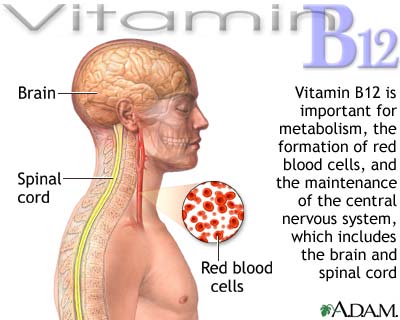The Role of Vitamin B & Folic Acid in Spina Bifida
(This article was updated on July 19, 2022)
You must have heard a lot of talk surrounding how instrumental vitamins can be in preventing spina bifida (SB), but how much do you really understand about it? What is the role of vitamin B and folic acid in the development of Spina Bifida, Spina Bifida Occula , Meningocele and Myelomeningocele What is vitamin B12, and does folic acid stop Spina Bifida?
This article answers these questions and more to help you understand the importance of vitamins in relation to SB.
Source: ADAM Encyclopedia
What Vitamin Deficiencies Cause Spina Bifida?
Folate deficiency is known to contribute to the development of SB; however, there is no single known cause for the condition. A combination of genetic, nutritional, and environmental factors increases the risk of developing the condition. One of the most essential vitamins for the neural tube during pregnancy is folate. Folate is also known as vitamin B9 and folic acid [1].
Folic acid is essential for important biochemical reactions in the body and can reduce the risk of spina bifida in a developing child. Folic acid, also known as folate, can help prevent neural tube defects, including spina bifida[1]. Deficiencies of folate increase the risk of spina bifida.
For many years cobalamin level has been tested by measuring its concentration in the serum. Its low concentration in serum is a sensitive indicator of probable neural tube defects, primarily spina bifida.
Vitamin B12 is also said to contribute to SB’s development. However, it is essential to note that any type of cobalamin and folic acid deficiency can cause spina bifida and other neural tube defects[1-2].
Genetic role of Vitamin B12 cobalamin in spina bifida
People at risk of SB may have genetic variations/gene mutations that alter the metabolism of cobalamin. Any change in the MTHFR gene or decreased concentration of cobalamin in relation with polymorphism in methionine synthase reductase (the enzyme that starts cobalamin methionine synthase) has been reported to increase the risk of Spina Bifida more than 5 times [3].
What Is Vitamin B12?
Vitamin B12, also known as cobalamin, is essential for healthy blood. It helps the body make DNA, the genetic material in all cells. The body needs a sufficient amount of this vitamin daily, but many people don’t get enough.
Deficiency can result in severe symptoms, including numbness, fatigue, and depression. If you don’t get enough vitamin B12, your nervous system will not function properly, and you could have a range of symptoms, including memory loss, mania, and mood changes[2,6].
Deficiency can cause several symptoms, including depression, irritability, and impaired vision. The deficit can affect cells in other parts of the body as well. In addition to deficiency symptoms, people with a vitamin B12 deficiency can experience psychological problems, loss of appetite, and unsteadiness.
Talk to your healthcare practitioner if you suspect you are suffering from a vitamin B12 deficiency [2,6].
Pernicious anemia, also known as megaloblastic anemia, is a severe autoimmune disorder. A person suffering from this condition will have abnormal red blood cells, and their bone marrow will produce fewer of them.
Megaloblastic anemia also causes premature red blood cell death. Vitamin B12 absorption requires the intrinsic factor (IIF) to be present. This enzyme is needed to absorb vitamin B12[2,6].
Although it is possible to avoid vitamin B12 deficiency, it is best to ensure you eat a balanced diet that includes food supplements that are fortified with this vitamin.
However, you may want to consider a vitamin B12 supplement if you eat mainly plant-based diets. Doctors may also recommend a supplement for patients with conditions such as Crohn’s disease or pernicious anemia[2,6].
Great video showing foods with a high amount of Vitamin B12
What B Vitamin Prevents Spina Bifida?
Taking vitamin B9 supplements is one way to reduce the risk of neural tube defects, including spina bifida. A healthcare provider may prescribe supplements with folic acid [2-3].
Researchers believe that the risk of spina bifida is much higher in children from lower socioeconomic families. Studies have shown that an improper diet may contribute to the risk. To combat this growing problem, pioneer surgeons have developed an experimental technique known as prenatal surgery.
Prenatal surgery is performed between 19 and 25 weeks of pregnancy. This technique is backed by the March of Dimes and the National Institute of Child Health and Human Development[2-3].
If your family history of SB suggests that you take folic acid, you should start taking it in your diet before conception. Experts recommend taking 400 micrograms of folic acid each day before conception. Supplementation with this vitamin during pregnancy does not prevent the development of SB, but it can reduce the risk significantly.
It is also important to note that this is not medical advice and may vary in specific cases[2-3].
Video from the Spina Bifida Association about why you should take Folic Acid Vitamin B9
How Much Does Folic Acid Reduce Spina Bifida?
Folic acid can significantly reduce the likelihood of having a child with SB by up to 50% with a daily consumption of 0.4 mg. While research is ongoing, studies indicate that folic acid can significantly reduce the risk of neural tube defects such as spina bifida.
In fact, researchers at the Centers for Disease Control and Prevention examined two surveillance systems to determine which of the two was more effective in preventing neural tube defects.
However, despite these promising results, a pregnant woman should always consult her doctor before taking folic acid[4].
In the United States, about 50 percent of pregnancies are unplanned, so it’s essential to have a high folate intake during your periconception. During this time, folic acid is critical to fetal development and helps prevent some types of cancer. Among the most important benefits of folic acid are its protective effects against congenital disabilities.
These are just a few of the reasons why so many health care providers recommend eating plenty of folic acid-rich food and taking folic acid supplements during pregnancy.
(The video by the CDC documents the compelling story of how Folic Acid fortification has become a staple in the lives of women of child-bearing age everywhere to protect their babies from developing SB).
The deficiency of vitamin B12 can result in neurological changes, including anemia. While folic acid can help with a vitamin B12 deficiency, it may mask symptoms of anemia and other conditions.
Although most people can get all the folate they need from a healthy diet, those with specific health conditions should consider taking a supplement. This isn’t necessary, but it’s worth a try if you’re concerned about a deficiency in vitamin B12 or folate[5].
What Are 10 Food Sources Of Folic Acid?
Folic acid is found in green leafy vegetables, nuts, citrus fruits, fortified breakfast cereals, and many other foods, as you will see below.
Sesame seeds
Sesame seeds are an excellent source of folic acid. In 100 grams, sesame seeds contain nearly 97 ug of folic acid, making them a perfect choice for pregnant women. Sesame seeds are also packed with healthy fats and proteins. Sesame seeds also help you sleep better, and a sprinkle of them on your salad can boost your folate intake[7-8].
Peanuts
Peanuts contain a high amount of folic acid. The amount found in a 100g serving of cooked peanuts is about 171 ug. It is also important to note that peanuts are also high in protein and fat[7-8].
Sunflower seeds
Sunflower seeds are packed with folic acid. Half a cup contains 150 micrograms of this nutrient. They are also rich in essential vitamins and heart-healthy oils. They are also a great snack, as they can be sprinkled on salads, added to bread and muffins, and used as a coating for chicken. During pregnancy, it is particularly important to eat plenty of folic acid-rich foods, including sunflower seeds[7-8].
There are some risks to eating sunflower seeds while pregnant, though. It is essential to consult your doctor before starting to eat sunflower seeds[7-8].
Whole grains
Whole grains are:
- A great source of folic acid.
- An essential nutrient for healthy bones.
- The Teeth.
- Immune system.
You can eat whole grains in a variety of forms, including bread made from 100% whole wheat. Whole wheat bread, for example, is made from whole wheat berries, which are milled into flour. It is more nutritious to eat whole grains than to eat refined grains, which are often enriched with iron and other vitamins and minerals[7-8].
Seafood
Cooked mollusk, scallop, and mixed species contain the highest amounts of folic acid at 19.3 ug per 100 grams. Other seafood sources include oysters, shrimp, and mussels. These types of seafood are also low in fatty acids. However, they are high in protein, so it may be worth choosing them in moderation.
They also contain many other essential nutrients, including vitamin B12 and omega-3 fatty acids[7-8].
Fortified cereals
Cereals contain a significant amount of folate and are a popular breakfast food. Fortified cereals have an extra proton, but they are still a great source. Add milk to your cereal for a hearty breakfast. Some other fortified foods also contain folic acid[7-8].
Fruits
Fresh fruits and natural fruit juices are another excellent source of folic acid; almost all fruits are high in folate. Some of these fruits include limes, lemons, oranges, grapefruit, mangos, kiwis, and pomegranate[7-8].
Eggs
Eggs are high in folate and can help alleviate tiredness, depression, and anemia. Folate also helps prevent temporary infertility. Beef liver is another fantastic food source for folic acid. A single egg contains between 40 and 86 ug of folate[7-8].
Beans
Beans and lentils contain a high concentration of folate. Legumes vary in folate content, but they are a good choice if you want to limit your intake of red meats. While they are high in calories, they are also a great way to sneak in some extra protein for breakfast[7-8].
Beef liver
Beef liver also contains folate but is not a good choice for vegans. It has the same amount of sodium and potassium as a banana and may be higher in fat, so it isn’t an excellent choice for those trying to make a healthy vegetarian diet[7-8].
Aside from folate-rich foods, it would be best if you also considered the benefits of eating a variety of foods rich in this nutrient. These foods are cheap, natural, and contain other nutrients that are important to your health.
You may not be getting the recommended daily dose of folate, so it’s best to eat a variety of foods. If you’re not a fan of beans, try peas or other legumes instead[7-8].
How does Folic Acid Help in Neural Tube Development?
Both DNA and RNA are synthesized through methylation reactions and nucleic acid synthesis. Folic acid helps with neural tube development because of its unique ability to conduct one-carbon transfer, which is essential in methylation reactions as well as nucleic acid synthesis.
A lack of folic acid or the appropriate enzymes to convert folic acid to folate can lead to improper neural tube formation, causing neural tube defects[9].
(Interview with Dr. Patrick MacLeod at the Department of Medicail Genetics University of British Columbia. Here he talks about why and how he fought for Folic Acid in the prenatal stages and how it prevents SB)
DNA synthesis must be performed at its best. This is because the embryo fails to synthesize the correct nucleotides in early pregnancy, which is crucial for rapid cell division and growth.
The neural tube is not properly closed because the embryo lacks the ability to synthesize DNA at an efficient rate and form the required proteins[9].
Neural tube defects are the most common central nervous system malformation, second only to cardiac defects[9]. The link between folate and neural tube defects was first identified over 50 years ago, and a great deal of attention has been paid to the subject.
As other major morbidity and mortality causes have declined, these congenital malformations’ importance has increased dramatically.
Deficiencies of neural tube development affect one in every ten babies. Folic acid helps prevent neural tube defects, which are serious problems during the first 28 days of pregnancy[9].
Why is Vitamin B12 Important for Spina Bifida?
Vitamin B12 is vital for SB because researchers have found that low levels of Vitamin B12 in the blood increase the risk of neural tube defects like spina bifida. This vitamin can be found in foods fermented by bacteria.
It is crucial to ensure adequate dietary intake, as well as a high level of absorption in the gastrointestinal tract (GIT), to prevent SB. Older women with GIT problems are also more susceptible to producing offspring with the condition[10-11].
Researchers analyzed blood samples from almost 1,200 women in Ireland. They found that women with low vitamin B12 levels had babies with neural tube defects five times more likely than women with high levels.
However, the researchers caution that further research is needed to determine whether this nutrient can reduce the risk of congenital disabilities. Therefore, pregnant women should aim for vitamin B12 levels of at least 300 nanograms per liter in their blood before becoming pregnant[10-11].
In this stage of development, the brain needs enough of the vitamin to develop normally. Women who eat only vegetarian food should make sure that they get adequate vitamin B12 intake. However, vegetarians should eat more animal products such as poultry and seafood.
The body may absorb the nutrient from fortified foods, including breakfast cereals and veggie burgers[10-11].
Can Vitamin B12 Deficiency Cause Birth Defects?
This video was created by McMaster University Medical students in collaboration with the McMaster Demystifying Medicine Program.
Although vitamin B12 deficiency is rare, it is linked to an increased risk of certain congenital disabilities. If a mother is deficient in this vitamin, her baby could suffer neural tube defects, intrauterine growth retardation, preeclampsia, or early miscarriage.
The resulting neurological delay in the baby can be permanent. Luckily, it is not uncommon for women to get enough B12 through fortified foods and animal products[12].
One study in Ireland found that babies born to women with low levels of vitamin B12 were five times more likely to have neural tube defects than those from mothers with normal levels.
Nevertheless, women with high levels of vitamin B12 had half the risk of having a baby with a neural tube defect. Consequently, pregnant women should make sure their vitamin B12 levels are at least 300 nanograms per liter before getting pregnant[12].
A low level of vitamin B12 could also cause neural tube defects. Neural tube defects occur when the brain and spinal cord don’t properly develop. Low levels of folate may also increase the risk of neural tube defects[12].
For these reasons, a mother should get sufficient amounts of folate. It is also important to make sure her baby gets enough of the vitamin. A woman should take a supplement of vitamin B12 during pregnancy to increase her baby’s chances of having a normal baby.
When Should I Start Taking Folic Acid To Prevent Spina Bifida? Vitamin B9 Vs Vitamin B12
It is important to start folic acid and vitamin B12 supplements at least four months before conception to ensure the best chance of preventing SB. Additionally, there are instances where the recommended folic acid consumption is a 4.0- mg daily dose from at least one month before conception through the first three months of pregnancy[13].
However, women should consult their healthcare providers before beginning the supplements.
New References
- Food and Nutrition Board, authors; National Research Council, editor. Dietary reference intakes for thiamin, riboflavin, niacin, vitamin B6, folate, vitamin B12, pantothenic acid, biotin, and choline. National Academy Press; Washington, DC, USA: 1998. Institute of Medicine, Vitamin B12; pp. 306-56.
- Anonymous. Recommendations for the use of folic acid to reduce the number of cases of spina bifida and other neural tube defects. MMWR Morb. Mortal. Wkly. Rep. 41 (Rr-14): 1-7, 1992.
- Wilson A, Platt R, Wu Q, Leclerc D, Christensen B, Yang H, et al. A common variant in methionine synthase reductase combined with low cobalamin (vitamin B12) increases the risk for spina bifida. Mol Genet Metab. 1999;67:317-23.
- Stabler S.P., Allen R.H. Vitamin B12 deficiency as a worldwide problem. Annu. Rev. Nutr. 2004;24:299–326.
- National Health and Medical Research Council, authors; Department of Health and Ageing, editor. Australian Government; Canberra, Australia: 2005. Nutrient Reference Values for Australia and New Zealand; pp. 91-6.
- Vitamin B12. (2019, June 4). The Nutrition Source. https://www.hsph.harvard.edu/nutritionsource/vitamin-b12/
- Folate (Folic Acid) – Vitamin B9. (2012, September 18). The Nutrition Source. https://www.hsph.harvard.edu/nutritionsource/folic-acid/
- Link, R. (2020, February 27). 15 Healthy Foods That Are High in Folate (Folic Acid). Healthline; Healthline Media. https://www.healthline.com/nutrition/foods-high-in-folate-folic-acid
- Neural Tube Defects (NTD): Folic Acid and Pregnancy | The Embryo Project Encyclopedia. (2018). Asu.edu. https://embryo.asu.edu/pages/neural-tube-defects-ntd-folic-acid-and-pregnancy
- Trinity College Dublin. (2022). Low levels of Vitamin B12 Increase Risk of Spina Bifida. https://www.tcd.ie/news_events/articles/low-levels-of-vitamin-b12-increase-risk-of-spina-bifida/
- Low Levels of Vitamin B12 May Increase Risk for Neural Tube Defects. (2015, August 29). National Institutes of Health (NIH). https://www.nih.gov/news-events/news-releases/low-levels-vitamin-b12-may-increase-risk-neural-tube-defects
- NHS Choices. (2022). Complications – Vitamin B12 or folate deficiency anaemia. https://www.nhs.uk/conditions/vitamin-b12-or-folate-deficiency-anaemia/complications/
- Recommendations for the Use of Folic Acid to Reduce the Number of Cases of Spina Bifida and Other Neural Tube Defects. (2022). https://www.cdc.gov/mmwr/preview/mmwrhtml/00019479.htm
Old References
- Food and Nutrition Board, authors; National Research Council, editor. Dietary reference intakes for thiamin, riboflavin, niacin, vitamin B6, folate, vitamin B12, pantothenic acid, biotin and choline. National Academy Press; Washington, DC, USA: 1998. Institute of Medicine, Vitamin B12; pp. 306-56.
- Anonymous. Recommendations for the use of folic acid to reduce the number of cases of spina bifida and other neural tube defects. MMWR Morb. Mortal. Wkly. Rep. 41 (Rr-14): 1-7, 1992.
- Wilson A, Platt R, Wu Q, Leclerc D, Christensen B, Yang H, et al. A common variant in methionine synthase reductase combined with low cobalamin (vitamin B12) increases risk for spina bifida. Mol Genet Metab. 1999;67:317-23.
- Stabler S.P., Allen R.H. Vitamin B12 deficiency as a worldwide problem. Annu. Rev. Nutr. 2004;24:299–326.
- National Health and Medical Research Council, authors; Department of Health and Ageing, editor. Australian Government; Canberra, Australia: 2005. Nutrient Reference Values for Australia and New Zealand; pp. 91-6.
Related Articles:
- Cost of Treatments for Spina Bifida (incl Utero, Surgery, Therapy, etc)
- 10 Ways to manage Spina Bifida Back Pain
- 6 Complications of Bladder Augmentation in Spina Bifida
- 6 Disorders Associated with Spina Bifida
- Open Neural Tube Defect (Types, Causes, Diagnosis & Treatment)




